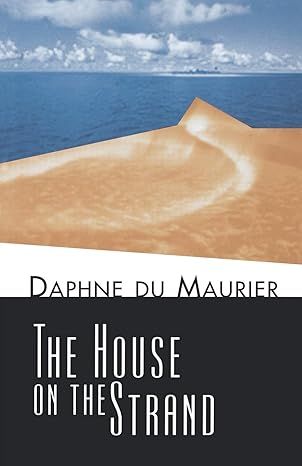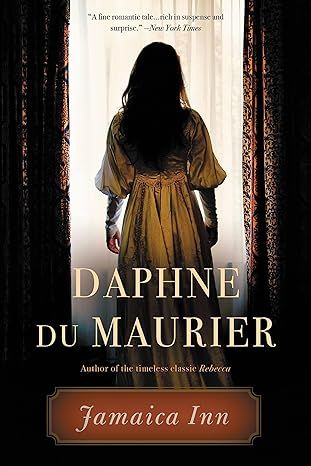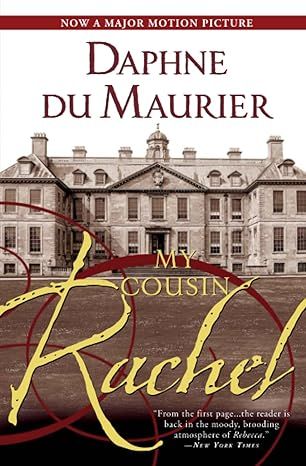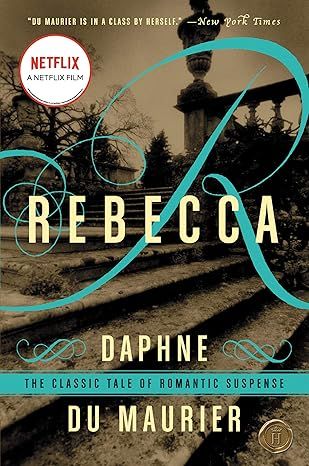The House on the Strand
4.3 out of 5
1,856 global ratings
In this haunting tale, Daphne du Maurier takes a fresh approach to time travel. A secret experimental concoction, once imbibed, allows you to return to the fourteenth century. There is only one catch: if you happen to touch anyone while traveling in the past you will be thrust instantaneously to the present.
Magnus Lane, a University of London chemical researcher, asks his friend Richard Young and Young's family to stay at Kilmarth, an ancient house set in the wilds near the Cornish coast. Here, Richard drinks a potion created by Magnus and finds himself at the same spot where he was moments earlier—though it is now the fourteenth century. The effects of the drink wear off after several hours, but it is wildly addictive, and Richard cannot resist traveling back and forth in time. Gradually growing more involved in the lives of the early Cornish manor lords and their ladies, he finds the presence of his wife and stepsons a hindrance to his new-found experience. Richard eventually finds emotional refuge with a beautiful woman of the past trapped in a loveless marriage, but when he attempts to intervene on her behalf the results are brutally terrifying for the present.
Echoing the great fantastic stories of H. P. Lovecraft and Edgar Allan Poe, The House on the Strand is a masterful yarn of history, romance, horror, and suspense that will grip the reader until the last surprising twist.
304 pages,
Kindle
Audiobook
Hardcover
Paperback
Audio CD
First published December 31, 1999
ISBN 9780812217261
About the authors
Daphne Du Maurier
Daphne du Maurier was born in 1906 and educated at home and in Paris. She began writing in 1928, and many of her bestselling novels were set in Cornwall, where she lived for most of her life. She was made a DBE in 1969 and died in 1989.
Reviews

Michele
5
My favorite DDM after Rebecca
Reviewed in the United States on May 17, 2014
Verified Purchase
Having read The House on the Strand twice in print and now having listened to it in audio, I can say it is definitely my favorite Daphne Du Maurier work after Rebecca.
This review is of the audio version produced by Naxos books, which doesn't seem to exist on Amazon.
Set in the 1960s, it is the story of Richard "Dick" Young whose best friend, a scientist, convinces him to try a new drug he's developing. It doesn't take much to convince Dick, actually, since he almost worships his friend Magnus and would do anything to please him. Alone in Magnus' house in Cornwall, unemployed and waiting for his wife's arrival from America, Dick takes the drug which transports him back in time 600 years. From then on he is quite literally hooked; bored and unsatisfied with his own life, he is captivated by the drama he witnesses in the 13th century and, heedless of the tremendous danger to himself, persists in taking the drug and experiences several "trips" back in time.
I'll admit that this plot sounds far-fetched, even ridiculous, and I doubt that anyone but Daphne Du Maurier could pull it off. However, so skilled was she as a writer that the plot is not just plausible but captivating. And of course, being a DDM there is a significant element of suspense as the reader witnesses Dick's increasing addiction to the drug and the time travel and the unraveling of his own life around him. Just how will it all end? DDM brings it all to a perfect conclusion.
This captivating story is one that I will doubtless read or listen to again. Michael Maloney's narration is excellent.
Read more
11 people found this helpful
J. Will
5
Novel written years ago is still very readable.
Reviewed in the United States on September 17, 2020
Verified Purchase
I haven't read du Maurier since I was in high school. The very cultured British lady was a writer. "The Strand" is original, very readable and a bit educational. The overall reading experience was well worth the effort. Some might find a bit of Brokeback Mountain in the plot. My nitpick would be that i found the adventures in the present time more interesting than the lapses into the past. Nonetheless, when one is pandemically confined, this makes for a good escape.
Read more
3 people found this helpful
susan4stars
5
A multi-layered time travel book
Reviewed in the United States on July 10, 2018
Verified Purchase
Of course I’m a fan of du Maurier’s earlier classics such as Rebecca and Jamaica Inn, but this is her best novel, in my opinion. It’s not a gothic type mystery like many of her others. It’s much more complex—an intriguing time-travel book with multiple layers— and thus more enjoyable.
Yet, the first time through, I didn’t like it as much. I enjoyed the time travel aspect to 1300’s Cornwall, but I was sometimes confused by the plot and the many place names that sounded the same.
Upon rereading it, I was able to better appreciate du Maurier’s wonderful descriptive writing and the modern day nuances related to the time travel plot: deception, mystery, addiction, and even a hint of gender identity.
If you read this book a long time ago and weren’t sure about it, I urge you to try it again. It’s a fabulous read.
Read more
41 people found this helpful
Diogenes
5
Historical realism meets time travel
Reviewed in the United States on May 25, 2013
Verified Purchase
Nicely plays the romantic narrative from the Middle Ages against the more humdrum reality of the 'present', notwithstanding its semi-miraculous 'time travel' element - so that the reader can't wait for the next return to the fascination of the Middle Ages 'reality'. Potential readers should be prepared to love a traditional historical romance, seen through and framed by, a (relatively) modern-day optic and the geographical location common to both eras. Clearly this was a locale du Maurier knew well, and a bygone era she was able to vividly evoke. It brought me face to face with the realities of life in the first century or two after the Norman Conquest, when a new 'aristocracy' was imposed on the native population and when 'might made right', at least until Runymede would begin the centuries-long process of democratisation. There is no shortage of historical romance, though not all were so realistically conveyed before du Maurier and time travel has been a dependable gimmick since H G Wells. Combining these elements, or perhaps 'dimensions' was a bold step in du Maurier's time and makes this work something of an oddity. Many authors today have taken gladly to historical realism; still, there is charm aplenty in this pioneer.
Read more
M. Wilsen
5
My favorite novel of all time
Reviewed in the United States on June 6, 2011
Verified Purchase
I first read this book in Jr High school in the 70's- a teacher had brought it to my attention after noticing that I read mainly British books in the Reading Lab Class- I was instantly enthralled by the story and Daphne Du Mauier's style. I have read everything she has written The story masterfully blends Fact & Fiction as well as being a Time Travel historical novel. Dick Young takes a drug given to him by his friend Magnus that transports him back in time to the 1300's in cornwall but leaves his body in present- Dick can heard & see the Past but cannot communicate or interfer in it. The Past soon consumes his thoughts and time- leaving his wife and step sons outsiders- ( they not knowing about the drug/time travel.)
I have read the book many times and listening via the book on tape ( I dubbed the library copy on cassette) and still love it. The House on the Strand not only opened up the world of Du Maurier but of Cornwall England. I have spent 3 days in the village & area where the book takes place staying right across from church were much of the book both past & present take place. ( the book contains a map) I brought alone a few of the book on tape so I could listen as I walked many of the same places in the book.
While a CD of this book ( or download) would have been Ideal I have not been able to find an Unabriged version (I am sure I would be Unsatified with an Abriged version!) so until there is I a happy to have my own Professionally made copy ( this being a Library cast off it has some wear & tear but still playable)
Read more
2 people found this helpful
B. McEwan
4
New Twist on Time Travel
Reviewed in the United States on December 5, 2004
Verified Purchase
I like time travel books and will go out of my way to seek out a good one. In this novel, the author uses an unusual device for moving the hero around in time -- a potion that he drinks takes him to a time where he seems to have emotional connections with the people he meets.
While he is walking about in the past, in this case the Middle Ages, he is unseen by the people of the time. And in another interesting twist, while his mind is firmly experiencing past events, his body remains in the present, walking around the same terrain that his mind is exploring in the past. This means that his body can encounter present physical barriers that did not exist in the past, and vice versa. That makes for some oddly humorous, as well as dangerous scrapes for the hero. He is routinely injured, and one of his friends actually dies during time travel when he walks into a moving freight train.
This time travel device used by Du Maurier reminded me of the technique empolyed by Carl Sagan in his novel, Contact. Bear with me here, because this similarity is not as far-fetched as it might seem at first. In Sagan's book, the heroine travels through space/time to meet aliens, even though it looks to observers on the ground as though she went nowhere. Her body remains in the spacecraft, but somehow her mind makes the journey solo. This is essentially the same device used in the House on the Strand, although the latter has additional nice touches, such as a bond between the characters of both centuries and the land on which they live.
Overall, this is a very good adventure with a moral undercurrent that is subtle and resists being too "in-your-face" preachy. For me, that underlying message has to do with being present for one's life and resisting the impulse to spend too much time living in your head, regardless of how compelling you might find your own thoughts.
Read more
76 people found this helpful
Billard
4
Great read.
Reviewed in the United States on February 5, 2016
Verified Purchase
As a fan of Daphne du Maurier I'm always inclined to give at least 4 stars but that said, I've yet to read a book of hers that I've not enjoyed or wasn't well written. I'm always amazed at how she can seamlessly combine different eras in time that at the outset of the book I think she won't be able to do. I think what I enjoy most about her writing is that the characters come completely alive to the point that you almost feel they are in the same room as you. This story is about a man who takes an experimental drug and goes back in time, As the story progresses, his addiction increases and the side effects become more apparent. He just has to keep going back one more time to find out what happened next! He wants to live more in the other world than the real world and sometimes confuses the two which is obviously having a negative effect on the people around him - a fairly typical story of addiction I should imagine. The problem is that even though the reader can see what's happening and want him to stop we too want him to go back to find out what happens next! We don't get to know Dick's wife or step-sons very well but I get the impression they are good people and if Dick wasn't so addicted to his other life he could give the marriage a chance and be happy. One problem I had with this book is that lots of the characters had similar names (or the same) and I had to keep going back to work out who was who. Could really have done with the x-ray function on Kindle on this one.
Read more
21 people found this helpful
Montana Mackay
4
A DuMaurier Departure
Reviewed in the United States on April 6, 2014
Verified Purchase
This was not the typical DuMaurier novel -- if there is such a thing. I have read quite a few of her books, and they are each pleasantly distinguishable from one another. This one, however, has a male main character--Richard--which was a twist. It is written in the present-day (mid-to-late 20th century, anyway), and uses language and themes current to that era -- as well as the time-travel elements of the 1300s that form the intrigue of the book. So it is different.
It didn't capture me as quickly as her other novels, nearly all of which drew me in very quickly--Rebecca and Frenchman's Creek especially. This one has a longish, vague introductory section wherein the reader has to really guess at what's going on and where the action is headed. Once it's clear that drug-induced time travel is the recurring motif, it moves along well. Both the present world and the world of the 14th Century characters to whom Richard becomes addicted are well-illustrated and compelling. Richard becomes significantly alienated from his wife, Vita, because he is inordinately fascinated by the long-dead Isolda. I thought DuMaurier did an excellent job of portraying the way in which his wife's daily routines (e.g., her bathrobe, her cold cream, her gait, her voice) became excessively annoying to him -- a sort of descent into temporary madness.
I had a feeling that it would end in a peculiar way, and it did. It's a good book and worth the read -- but still not as good as DuMaurier's other works.
Read more
6 people found this helpful
Kirsten
4
A cautionary tale about drinking unknown substances with mysterious side effects
Reviewed in the United States on January 20, 2019
Verified Purchase
This book is not so much a story of time travel, but more an exploration of the perils of drug addiction, especially when you are already a little dissatisfied with reality and looking for escape. The narrator, Dick, is an insipid character who doesn't seem to have much enthusiasm for his wife, his stepsons or his career - the only person who inspires and motivates him is his childhood friend Magnus. Magnus invites Dick to stay for free in a Cornish cottage, asking in return for Dick to drink a little out of Bottle A in the basement and report back on what happens. Dick is exactly the kind of person to agree to something like this, even while he stubbornly refuses when his wife asks him to get a job or at least choose a holiday that suits the entire family. Bottle A transports Dick 600 years back in time, even though he technically stays in the same location, silently observing the local events of the 14th century. In a physical sense he is hallucinating - he sees the 14th century landscape while he navigates the 20th century landscape, so he is in constant danger, if he thinks he is in a field, but he's actually wandering across a road. In the 14th century he becomes captivated by the tragic friendship of Roger and Isolde, so he wants to keep coming back to see what happens next. As the story alternates between the 14th and the 20th century, the really interesting part of the story is Dick's increasing detachment from his real life - he is irritated by the presence of his wife and her sons, and constantly looks for opportunities to escape back into the past. The drug has an increasingly addictive hold over him, and he doesn't sufficiently concern himself with the possible side effects. Meanwhile his wife Vita is alarmed and suspicious by his increasingly bizarre behaviour - is he having an affair? Is he drinking heavily? - and it takes a terrifying event for them to seek the help he really needs. Unlike Dick, I found the modern story more engaging and interesting than the 14th century story, which was harder to follow, with multiple minor characters and stretched out over a longer period of time. Dick was truly a man who could not cope with reality - even if his life had the potential to be quite pleasant and enriching - so he chose drugs as an escape without seriously considering the consequences. Perhaps beyond the last chapter of the book, he had the time to consider that the life he was running away from wasn't so bad after all.
Read more
9 people found this helpful
Kindle Customer
3
Starts with a whimper and ends with a bang
Reviewed in the United States on November 21, 2017
Verified Purchase
3 stars
I delved into The House on the Strand due to my adoration of Daphne du Maurier's famous novel, Rebecca (one of my all-time favorites) as well as my deep appreciation for her other work, My Cousin Rachel. In addition to reading these masterpieces I would recommend watching both movies which were very well done. In contrast, I had mixed feelings about The House on the Strand.
Dick Young is invited to stay at his friend Magnus Lane’s house in Cornwall for the summer while Magnus, a chemist, is in London. Before Dick’s family arrives, Magnus persuades Dick to act as his guinea pig for a new substance that he claims has the ability to induce time travel. Magnus has tried this himself with only a few unpleasant side effects so what could go wrong?
I presumptuously assumed that because I relished what could be considered Daphne Du Maurier’s two most popular books that I would also love The House on the Strand. Unfortunately that was not the case. While the last 30% of the book was fascinating, I had trouble connecting with Dick’s historic time travel universe. Du Maurier does deserve praise however for the end portion of the novel, which, at times, is just as exciting as Rebecca.
I think the central obstacle that prevented me from enjoying this book more were the restraints placed on the concept of time travel. Time travel is supposed to be unpredictable and fun! So why does the time travel that takes place here need to happen in the confines of the same era every time? Why were certain interactions between Dick and the other historic figures prevented? Why are there so many of these historic figures and why do we even care about them?
Don’t get me wrong, I understand the reason DuMaurier kept returning to the same time period; it enables her to write a story within a story. However, even after finishing the novel I still don’t fully comprehend why she thought this would make for interesting reading. It was as though she spontaneously researched the 14th Century (?) in-depth and decided to clumsily weave it into the plot. Unfortunately, I still have difficulty recalling many of the ye olde characters she referenced because they weren’t memorable. Luckily, the reader can take solace in the fact that even this facet of the book improves towards the end.
What I did like about The House on the Strand, despite the grimace on my face, was the comedy of errors that is Dick’s relationship with his family, particularly his wife. Why are these two even married?? Even in light of these marital problems, I am still left wondering how Isolde able to have this siren-like hold on Dick? It would be like falling in love with a mirage… It is simply not believable. That being said, Dicks’ relationship with his wife provides an interesting juxtaposition to the latent undertones that characterize his relationship with his best friend Magnus. Do I recommend The House on the Strand? Yes, with some reservations. Don’t expect it to be the next Rebecca or My Cousin Rachel. They are on two entirely different playing fields. Getting through the first half (at least) takes some perseverance. However, the end of the novel was strongly written enough that I was practically yelling in astonishment at the insanity of it all. That my friends is not easily done
Read more
24 people found this helpful
Top Daphne Du Maurier titles
Best Sellers

The Tuscan Child
4.2
-
100,022
$8.39

The Thursday Murder Club: A Novel (A Thursday Murder Club Mystery)
4.3
-
155,575
$6.33

Sapiens: A Brief History of Humankind
4.6
-
140,302
$13.49

The Butterfly Garden (The Collector, 1)
4.3
-
88,556
$9.59

Things We Hide from the Light (Knockemout Series, 2)
4.4
-
94,890
$11.66

The Last Thing He Told Me: A Novel
4.3
-
154,085
$2.99

The Perfect Marriage: A Completely Gripping Psychological Suspense
4.3
-
143,196
$9.47

The Coworker
4.1
-
80,003
$13.48

First Lie Wins: A Novel (Random House Large Print)
4.3
-
54,062
$14.99

Mile High (Windy City Series Book 1)
4.4
-
59,745
$16.19

Layla
4.2
-
107,613
$8.99

The Locked Door
4.4
-
94,673
$8.53




